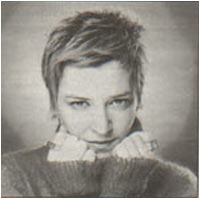LYNNE
RAMSAY STARTS WITH A PUNCH
By Dennis Lim Village Voice, October 17, 2000 "People
tend to romanticize childhood," says Glasgow-born director Lynne
Ramsay. "I think it's actually quite a brutal place. I'm not interested
in cutesy coming-of-age dramas; I much prefer something like Lord
of the Flies. Children are shown a kind of hypocrisy in the
adult world. People want to protect children, but children are never
protected, really."
Ramsay's first feature, Ratcatcher, beautifully captures both the agonizing vulnerability and the escapist flights of an impoverished childhood. Dreamily suspended between kitchen-sink and magical realism, it's an unsentimental, impressionist portrait that balances unblinking squalor and hallucinatory reveries against the startling backdrop of the mid-70's refuse workers' strike. Though Ratcatcher is less autobiographical than her prizewinning shorts, Gasman and Small Deaths, Ramsay drew heavily on her memories of the period. "I was about five, and the city was under siege, but it was magical, like this great playground--it felt almost medieval. For me beauty and horror have always been quite close, and that's often how kids are--you know, like the fascination they feel in looking at a dead animal." Ramsay says it was unfortunately easy to find suitably grim locations. "Those places do exist, although I'm sure the Scottish tourist board would rather not know that. We were even told, 'Don't bother to bring the rats--they're already here.' The people on the street we shot on were quite suspicious. But we got some of them involved as extras and it became almost like a community project." Much of the budget was devoted to building a polluted canal that looms large in the film--not just physically but psychologically and metaphorically, as the site of a defining trauma and the ominous locus of murky, unspoken fantasy. "It was quite ambitious for the money that we had," says Ramsay, "but I had a bonkers designer. We dug a big hole and actually found some toxic waste, which cost a lot to take away." Ratcatcher opens with a trance-inducing slow-motion shot of a boy at play, wrapping himself up mummy-like in lace curtains--and proceeds to wrong-foot the viewer by brutally killing off the kid in question and shifting the focus to his guilt-ridden friend, James. "The boy who drowns is more of a conventional cute kid," says Ramsay. "But I wanted to tell a story about this other kind of boy, who you're not too sure of. The first scene also sums up a lot of the film for me. It's poetic, and there's something scary about it, and then you're slapped back into this harsh reality." Ramsay doesn't dispute the bleakness of her film--"I tired to get to the root of what it's like being a 12-year old when there's not a lot of future"--but refuses to see it as a direct descendant of the British miserablist tradition. "I also wanted to show the other side, which is incredibly naďve and simple and beautiful. When people say the film's dark and heavy, it really pisses me off. I'll show you a few dark, heavy films that'll make this look like Disney." Since Ratcatcher premiered at Cannes last year, Ramsay has attained next-big-thing status in the U.K. (she won a BAFTA, among other awards) and, to her annoyance, has been subjected to numerous lofty comparisons--from Bresson to Malick, Loach to Scottish director Bill Douglas. "It's flattering, but when people compare it to social realism, it's as if they're not seeing the film,' she says. "And I get this 'you're Scottish, you're a woman' thing, which just makes you feel marginalized." In the move from short films to features, Ramsay says, "You get a lot of pressure to become a different kind of filmmaker, and you wonder why people asked you to make the film in the first place. I'm a bit of a fighter, though--I mean, if I don't feel something's right, I just can't sleep and it drives me absolutely mad." Ramsay did have to fight to keep the film's resolutely ambiguous ending. "I think there was pressure to have a happy ending from the financiers' and in my own way, it is a happy ending." She adds with a laugh: "I get letters with stamped self-addressed envelopes, asking, 'Please tell me what happened.'" (She doesnąt reply, so don't bother writing). Using all first-time crew and a mostly non-professional cast, Ramsay elicits remarkable performances from the untrained child actors (including William Eadie as James and the director's niece, Lynne Ramsay Jr., as James's sister). "I'm always looking out for the spontaneity in a very controlled situation," says Ramsay. "The camera's often quite close, but I got the kids use to that early on, just going around with a video camera. I never showed them the script, so it was exciting for them." Movies were
not a big part of Ramsay's own childhood. "If someone had said
to me that I was going to be a filmmaker, I'd be like, Yeah, right.
It was quite a working-class area where I grew up--you're more
likely to go to work when you're 16; there don't seem to be a
lot of options. But I did love musicals. I was brought up on them.
It was quite funny seeing Dancer in the Dark. You look
at something like Singin' in the Rain compared to that,
and you're like, fucking hell, they really knew what they were
doing." She ended up in art school in Edinburgh, where she pursued
a photography degree. The plan was then to attend the Royal College
of Art in London, but after seeing Maya Deren's Meshes in the
Afternoon, she applied to the National Film School and was
accepted to study cinematography. "I was terrible," she says laughing.
"I could make a beautiful still but I couldn't move the camera."
Her photography background still informs her work: "I home in
on details as a way of embellishing the character," she says.
"I like to make the minutiae the most important drama." |
||||
